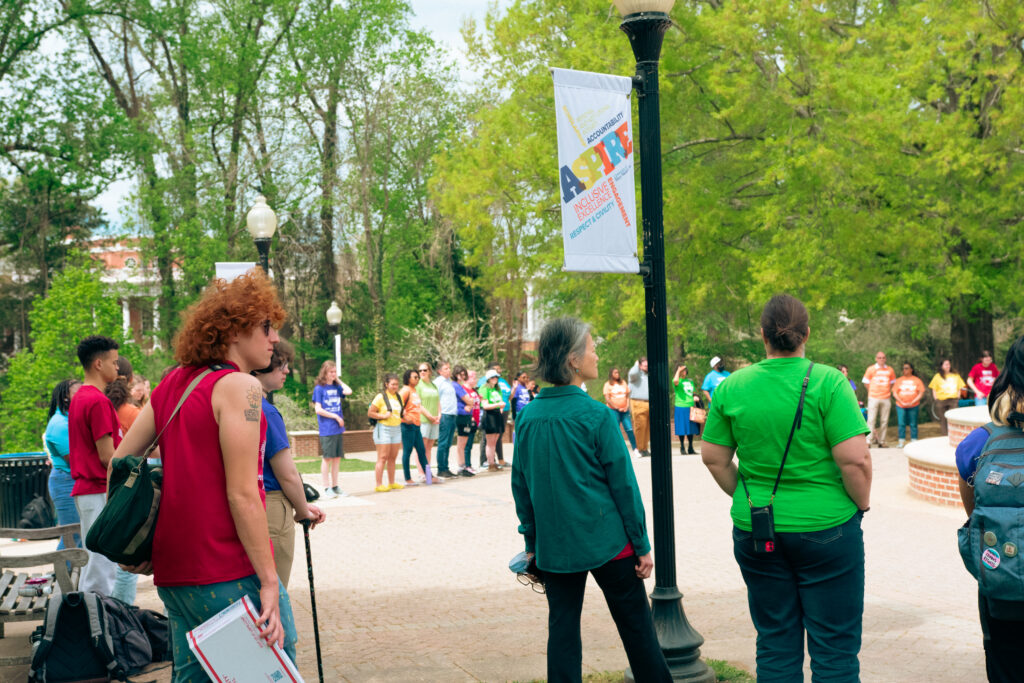Community gathers for PRISM Moment of Silence Vigil
3 min read
Students, staff and faculty gather around the Monroe Fountain during PRISM’s Moment of Silence Vigil. | Nellie Bittenbender, The Weekly Ringer
Emily Rule
Staff Writer
On Friday, April 14, UMW PRISM hosted the club’s annual Moment of Silence Vigil on the national Day of Silence. This event is meant to bring awareness to and combat hatred against members of the LGBTQ community.
The Day of Silence started as a tradition in 1996 by University of Virginia students. In 2001, the Day of Silence was officially organized and sponsored by the Gay, Lesbian and Straight Educational Network, who offered funding, staff and volunteers. Since then, it has become a national day of awareness that aims specifically to denounce the mistreatment and discrimination directed towards LGBTQ students, such as homophobia, transphobia, other sorts of hate crimes and bullying.
“The Day of Silence event is an event that spreads awareness and solidarity about the resistance to hate crimes and bullying,” said Logan Kurtz, a junior history major who attended the vigil. “During this event, students and staff group together to take a moment of silence. It is important to spread awareness, and to show that we are a school that does not stand for hate.”
UMW PRISM organizes an annual Moment of Silence Vigil to promote the values and objectives of the Day of Silence to the UMW campus community. At the vigil, LGBTQ students are given a platform where their voices can be heard and where they can highlight how they are targeted and silenced due to their LBGTQ identity.
“I was one of the speakers to the crowd of probably over a hundred people gathered for Day of Silence, I felt nervous, but also a sense of importance,” said Dawn Pfeifle, a PRISM executive board member and sophomore women’s and gender studies major. “I spoke on the rise of trans hate recently.”
The Day of Silence seeks to shed light on the experiences, identities and voices of individuals who identify as LGBTQ that have been silenced. According to the Network, students who take part in the Day of Silence take a vow of silence during the school day in effort to draw attention to the silencing of LGBTQ people through discrimination, homophobia and other actions that negatively target them because of their identity.
“It brings awareness to queer voices,” said Pfeifle. “Often, we have been silenced, and this is a time to honor them. We have queer people speak to the crowd, as well as an open mic night for queer voices.”
Each year, UMW PRISM orders t-shirts in the colors of the rainbow and, once handed out, people were asked to wear them specifically for the Day of Silence and the vigil that PRISM organizes.
“The ‘Breaking the Silence’ portion of the day follows the vigil and is an open mic event that allows for queer voices to be heard by inviting anyone to sing, read poetry, spoken word or anything of the sort,” said Samuel Christensen, a junior environmental science major and club president of PRISM.
The Day of Silence began as a class project on nonviolent protests. According to GSAFE, the first year the event was held, 150 students participated. Today, the Day of Silence reaches hundreds of thousands of students across the nation.
“It’s so important that people come to this event, no matter what your sexuality or gender is, to show support to the current lgbtq students on campus and to recognize the lgbtq people in generations past who have fought so hard for us to even get to the point where we could have this event,” said Syd Tadlock, a sophomore music and education double major.
According to the American Civil Liberties Union, there have been more than 400 pieces of anti-LGBTQ legislation proposed this year across the country.
“It is now more important than ever to defend queer voices and denounce their erasure, mostly especially for trans people, as hundreds of anti-trans bills have recently been introduced in state legislations,” said Christensen. “Through the Stonewall Riots, the AIDS crisis, and the contentious age we live in today, queer people have always existed, will always exist and always find a way to be heard.”


